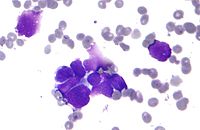
Photo from wikipedia
Background There are no established predictive biomarkers for the effectiveness of first-line atezolizumab plus carboplatin and etoposide therapy in patients with small-cell lung cancer (SCLC). Therefore, the current study aimed… Click to show full abstract
Background There are no established predictive biomarkers for the effectiveness of first-line atezolizumab plus carboplatin and etoposide therapy in patients with small-cell lung cancer (SCLC). Therefore, the current study aimed to investigate whether the Glasgow prognostic score (GPS), neutrophil-to-lymphocyte ratio (NLR), and body mass index (BMI) can predict the effectiveness of first-line atezolizumab plus carboplatin and etoposide therapy in patients with extensive-disease SCLC. Methods We reviewed data from 84 patients who received first-line atezolizumab plus carboplatin and etoposide therapy for SCLC at nine Japanese institutions between August 2019 and May 2021. Further, we evaluated the prognostic value of the GPS, NLR, and BMI. The Kaplan–Meier and Cox proportional hazard models were used to examine differences in progression-free survival (PFS) and overall survival (OS). Moreover, the GPS, NLR, and BMI consisted of C-reactive protein and albumin concentrations, neutrophil and lymphocyte counts, and body weight and height, respectively. Results The response rate was 72.6% (95% confidence interval: 63.0–82.1%). The median PFS and OS from the initiation of treatment were 5.4 (95% CI: 4.9–5.9) months and 15.4 (95% CI: 11.4–16.8) months, respectively. The GPS independently predicted the effectiveness of first-line atezolizumab plus carboplatin and etoposide treatment, as a favorable GPS (GPS 0–1) was correlated with significantly better PFS and OS rates compared to a poor GPS (GPS 2) (PFS: 5.8 vs. 3.8 months, p = 0.0005; OS: 16.5 vs. 8.4 months, p<0.0001). Conclusions This is the first analysis to evaluate the association between the GPS, NLR, and BMI and the treatment effectiveness of survival among patients receiving first-line atezolizumab plus carboplatin and etoposide therapy for SCLC. Among patients receiving this treatment for SCLC, GPS was significantly associated with the PFS and OS rates, suggesting that GPS might be useful for evaluating therapeutic outcomes in these patients.
Journal Title: Frontiers in Oncology
Year Published: 2023
Link to full text (if available)
Share on Social Media: Sign Up to like & get
recommendations!